Welcome to the world of hydroponic farming in Nigeria, where we unlock the incredible green-growing potential. With the increasing need for sustainable agricultural practices, hydroponics emerges as a game-changer. By cultivating plants without soil, hydroponic farming offers numerous benefits, such as higher crop yields, efficient use of resources, and year-round production.

Nigeria’s diverse climate and agricultural landscape provide an ideal setting for this innovative technique. This article will explore the fascinating world of hydroponic farming in Nigeria, showcasing its advantages and opportunities for farmers and the agricultural sector.
What is Hydroponic Farming in Nigeria?
Hydroponic farming is an innovative agricultural method that allows plants to grow without soil, using nutrient-rich water solutions instead. In Nigeria, where traditional farming faces challenges like limited arable land and unpredictable weather conditions, hydroponics offers a promising solution. With hydroponics, farmers can optimize space utilization by growing crops vertically or in controlled environments, making them suitable for urban areas or areas with limited land availability.
The diverse climate in Nigeria presents options for different hydroponic systems. In the southern regions with high humidity and ample sunlight, nutrient film technique (NFT) systems thrive. NFT systems allow a thin film of nutrient solution to flow over plant roots, providing the necessary nutrients. Deepwater culture (DWC) systems are popular in the northern regions with hotter temperatures.
In case you missed it: The Rise of Fish Farming in Nigeria: Key Rules to Start from Scratch
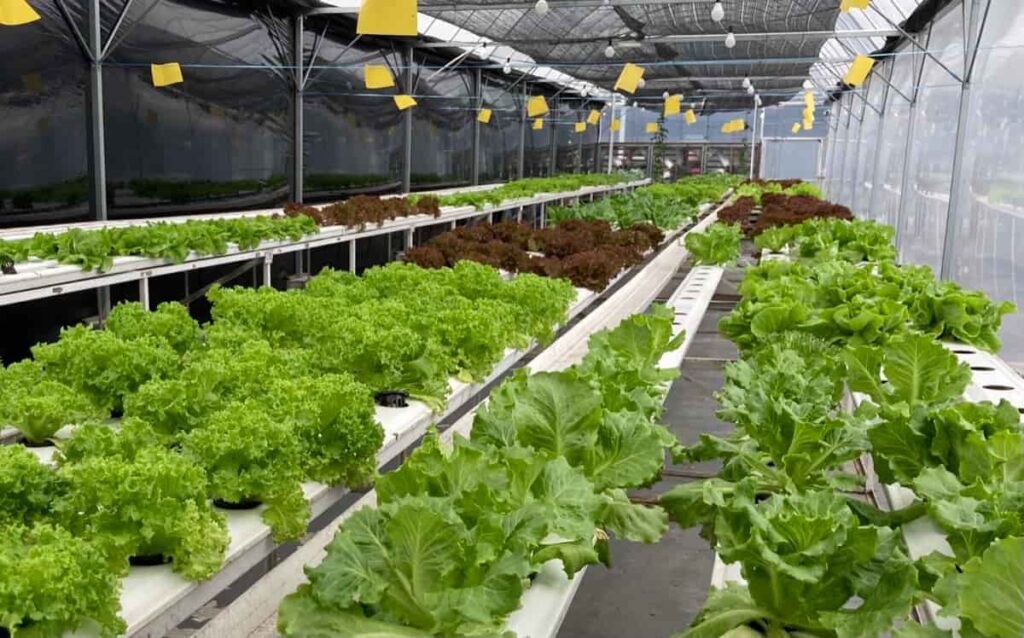
DWC systems involve suspending plant roots in oxygenated nutrient solutions, ensuring adequate hydration. Hydroponic farming in Nigeria offers benefits such as higher crop yields, reduced water usage, and fewer pest problems than traditional farming. It also enables year-round cultivation, reducing dependence on seasonal cycles.
Hydroponic Farming Techniques in Nigeria
- Nutrient Film Technique (NFT): This technique involves a shallow channel or tube through which a thin film of nutrient solution flows, continuously bathing the roots of the plants. It is well-suited for growing leafy greens and herbs.
- Deep Water Culture (DWC): DWC method involves suspending plant roots in oxygenated nutrient solutions. This technique is suitable for various crops and is relatively easy to set up.
- Drip Irrigation System: Drip irrigation delivers nutrient-rich water directly to the plant’s root zones using a network of tubes with emitters. It provides precise control over nutrient delivery and is suitable for various crops.
- Aeroponics: Aeroponics involves suspending plant roots in a mist or air environment, where nutrient-rich water is sprayed directly onto the roots. It offers efficient nutrient uptake and is ideal for growing delicate plants and root vegetables.
- Vertical Farming: Vertical farming utilizes vertical space to grow plants in stacked layers. This technique maximizes space utilization and is particularly beneficial in urban areas with limited land availability.
Benefits of Hydroponic Farming in Nigeria
- Increased Crop Yields: Hydroponic farming in Nigeria can significantly boost crop yields compared to traditional soil-based farming. This is due to the optimized nutrient delivery system, which ensures plants receive precisely what they need for optimal growth.
- Water Efficiency: Nigeria faces water scarcity challenges in certain regions, making efficient water usage crucial for agriculture. Hydroponics use up to 90% less water than traditional soil-based farming methods. This is because hydroponics recirculate water, minimizing wastage and allowing plants to absorb only what they need.
- Space Optimization: With Nigeria’s growing population and limited arable land, hydroponic farming offers a space-efficient solution. Vertical hydroponic systems maximize land utilization by growing plants in stacked layers, increasing crop density per square meter.
- Pest and Disease Control: Hydroponic systems reduce the risk of pest infestations and soil-borne diseases. Many pests and pathogens cannot thrive without soil, minimizing need for chemical pesticides and fungicides.
- Reduced Environmental Impact: Hydroponic farming minimizes chemical fertilizers and pesticides, reducing environmental pollution and soil degradation. It also reduces the need for land clearing, protecting natural habitats and biodiversity.
- Year-Round Cultivation: Unlike traditional farming, hydroponics allows for year-round cultivation, independent of seasonal variations. This enables farmers in Nigeria to have a consistent and continuous supply of fresh produce, contributing to food security.
- Faster Growth and Harvesting: Hydroponically grown crops mature faster than soil-grown crops. This accelerated growth rate allows quicker harvest cycles, increasing productivity and turnaround times.
- Quality Control: Hydroponic farming provides precise control over nutrient composition and environmental factors, resulting in higher-quality crops with improved taste, texture, and nutritional value. This can lead to increased market demand and better profitability for farmers.
In case you missed it: How to Start Tomato Farming in Africa: Production Guide for South Africa, Egypt, Nigeria, Kenya, Ethiopia, and Zambia
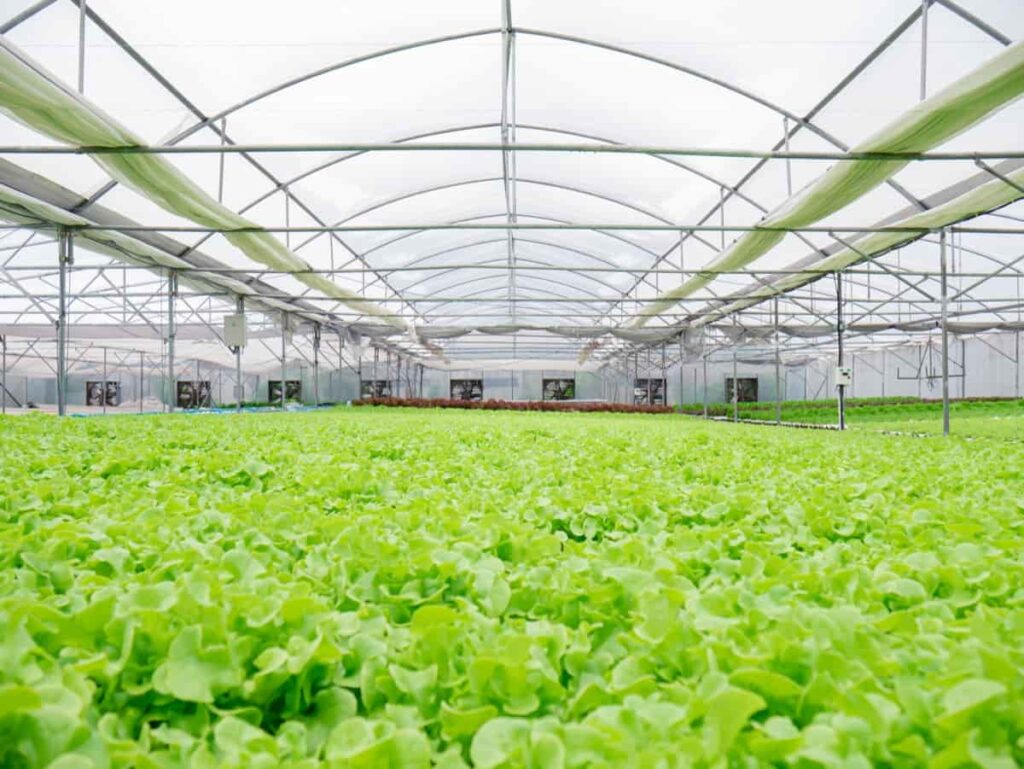
How to Start a Hydroponic Farm in Nigeria
Starting a hydroponic farm in Nigeria requires thorough research, acquiring the necessary materials and equipment, selecting a suitable location, and implementing effective growing and marketing strategies. Hydroponic farming offers several benefits over traditional methods, such as increased crop yields, cost-effectiveness, and resource efficiency.
To begin, conduct market research to understand the hydroponics industry in Nigeria, including system types, costs, and suitable crops. Acquire the essential materials and equipment, including the hydroponics system, growing containers, pumps, and substrates. Choose a location with access to electricity, water, and other resources. Once set up, monitor plant growth and adjust the hydroponics system accordingly. Marketing and selling the produce can be done through local markets, wholesalers, or even online platforms.
In Nigeria, various hydroponic farming techniques are prevalent. The Nutrient Film Technique (NFT) involves circulating a thin film of nutrient solution over plant roots. Deep Water Culture (DWC) suspends roots in a container of nutrient-rich water. Flood and Drain (ebb and flow) periodically flood and drain the root system. Aeroponics suspends roots in the air and sprays them with nutrient mist. Wick systems and drip systems are also employed for water and nutrient delivery.
Best Crops for Hydroponic Farming in Nigeria
Hydroponic farming in Nigeria offers excellent opportunities for growing a variety of crops. Leafy greens like lettuce, spinach, and kale are well-suited for hydroponic systems due to their high water content and fast growth rates. They can be harvested multiple times, ensuring a continuous supply. Herbs like basil, parsley, and mint thrive in hydroponic environments and provide a consistent source of flavorful herbs.
Tomatoes are popular for hydroponics, benefiting from controlled conditions and vertical growing techniques. Cucumbers and bell peppers also perform well in nutrient-rich water solutions. While slightly more challenging, strawberries can be grown successfully in hydroponic setups, offering a unique and sought-after crop.
Hydroponic Farming Equipment Suppliers in Nigeria
One prominent hydroponic farming equipment supplier in Nigeria is located in Lagos and provides a wide selection of hydroponic systems, including nutrient film technique (NFT) systems, deep water culture (DWC) systems, and vertical farming setups. They also offer a variety of essential components such as grow lights, nutrient solutions, pH meters, and air pumps.
In case you missed it: A Comprehensive Guide to Understanding the Working Model of Hydroponic Farming
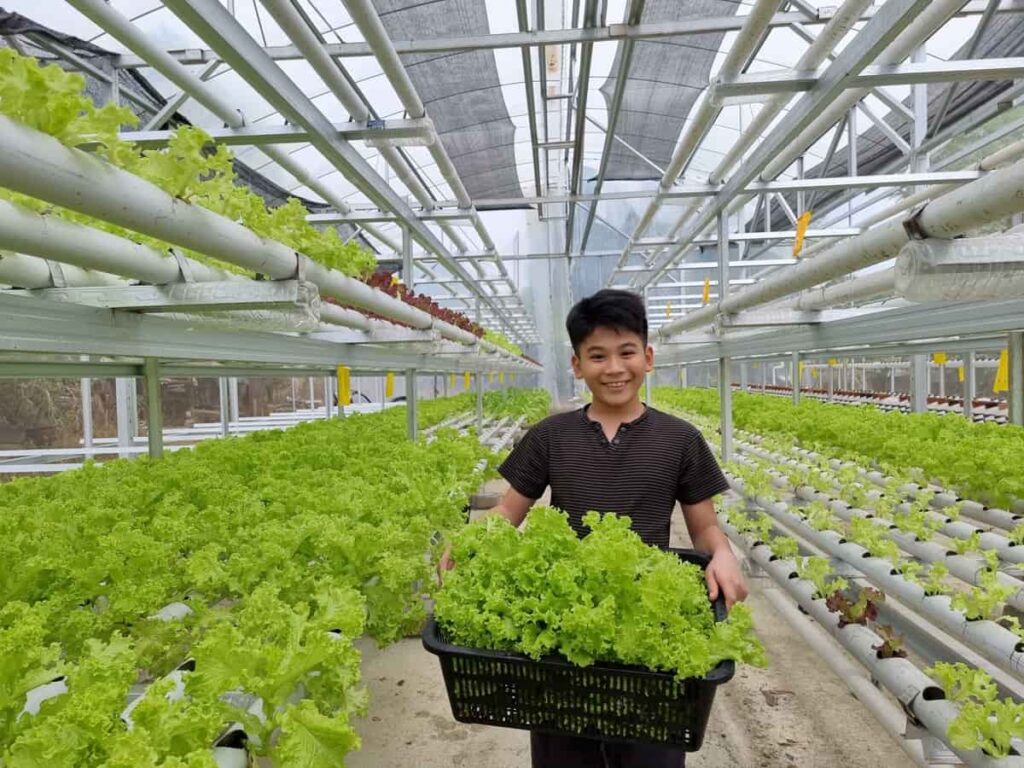
Another supplier, based in Abuja, specializes in greenhouse structures suitable for hydroponic farming. They provide customizable greenhouse solutions designed to withstand Nigeria’s climate conditions, offering features like ventilation systems, shading nets, and irrigation setups specifically tailored for hydroponics. Farmers must research and engage with multiple suppliers to find the best options for their needs, budget, and location in Nigeria.
Success Stories of Hydroponic Farming in Nigeria
Greenaira Hydroponics Farm in Lagos has successfully implemented hydroponic techniques to grow crops, including lettuce, tomatoes, and herbs. They have achieved impressive yields year-round by utilizing controlled environments, precise nutrient solutions, and efficient water management. Another inspiring success story is the Hydro Greens Farms in Abuja, where hydroponic farming has flourished.
They have harnessed the power of vertical farming, maximizing space utilization and producing an array of leafy greens and vegetables. With hydroponics, they have overcome limitations posed by traditional soil-based farming, ensuring consistent harvests regardless of weather conditions.
The Nigerian climate offers favorable conditions for hydroponic farming. The abundant sunlight and consistent temperature provide an ideal environment for plant growth. Additionally, hydroponics mitigates the challenges posed by limited arable land, water scarcity, and soil quality issues, making it a viable solution for sustainable agriculture in Nigeria.
Hydroponic Farming vs. Traditional Farming in Nigeria
When comparing hydroponic farming to traditional farming in Nigeria, it’s important to consider farmers’ unique conditions and challenges. Nigeria has a diverse climate, ranging from tropical in the south to semi-arid in the north. Traditional farming heavily relies on fertile soil and adequate rainfall, which can be unpredictable in certain regions. This poses a significant challenge to achieving consistent agricultural productivity. Hydroponic farming, on the other hand, offers a promising alternative.
By growing crops in a controlled environment without soil, hydroponics allows farmers to bypass soil limitations and optimize water and nutrient delivery directly to plants’ root systems. This method offers several advantages in Nigeria, including higher crop yields, reduced water usage, and the ability to grow crops throughout the year, irrespective of seasonal variations. Furthermore, hydroponic farming can be implemented in urban areas where arable land is limited. This opens up opportunities for small-scale farmers and urban agriculture enthusiasts to engage in sustainable food production.
Hydroponic Farming Training Programs in Nigeria
Nigeria has a growing interest in hydroponic farming, and several training programs have been established to meet the demand. These programs aim to equip farmers and agricultural enthusiasts with the knowledge and skills to implement hydroponics in the local context successfully. The Federal Ministry of Agriculture and Rural Development (FMARD) offers one prominent training program. This program provides practical training on hydroponic farming techniques, including nutrient solutions, crop selection, and system design. It also covers topics such as pest management and climate control.
In case you missed it: 15 Common Mistakes to Avoid in Hydroponic Farming: Beginner’s Guide
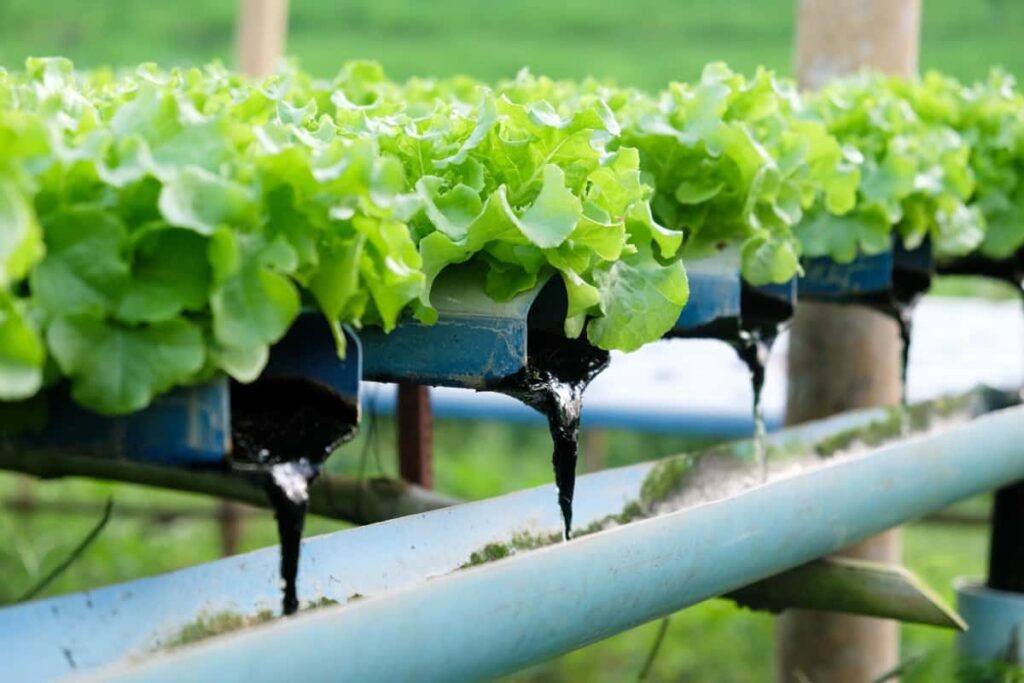
Some universities and research institutions in Nigeria have also developed hydroponic farming training programs. These programs focus on theoretical and practical aspects, offering participants hands-on experience setting up and maintaining hydroponic systems.
The unique environmental conditions in Nigeria, including a diverse climate and fertile land, make it conducive for hydroponic farming. The controlled hydroponics environment allows for year-round production, reducing the dependency on seasonal variations. Moreover, hydroponic farming can optimize water usage, a crucial factor in regions prone to water scarcity.
Hydroponic Farming Cost and Profitability in Nigeria
- Initial Investment: Setting up a hydroponic farm requires some initial capital investment. On average, the cost for a basic hydroponic system can range from ₦500,000 to ₦1,500,000, depending on the scale and complexity of the setup.
- Operational Costs: Hydroponic systems require nutrient solutions, electricity, water, and maintenance. These costs vary based on farm size, crop selection, and automation level. Monthly operational expenses can range from ₦100,000 to ₦300,000.
- Crop Returns: Hydroponic farming offers higher crop yields than traditional soil-based methods. Depending on the crop selection and market demand, returns can vary significantly. On average, hydroponic farmers in Nigeria can expect returns ranging from ₦1,000,000 to ₦5,000,000 annually.
- Profit Margin: The profitability of hydroponic farming largely depends on effective management practices, market conditions, and crop selection. With proper planning and efficient operations, 20% to 50% profit margins are achievable.
Challenges of Hydroponic Farming in Nigeria
Hydroponics farming in Nigeria is becoming increasingly popular due to its ability to grow crops without soil. This technique uses nutrient-rich water and mineral-based solutions to provide essential nutrients for plant growth. However, it presents several challenges, including the lack of reliable electricity, which can be difficult to maintain due to power outages and instability. Farmers must invest in alternative energy sources like solar power to ensure a consistent electricity supply.
In case you missed it: How to Grow Edible Flowers in Hydroponics: A Step-By-Step Guide for Beginners
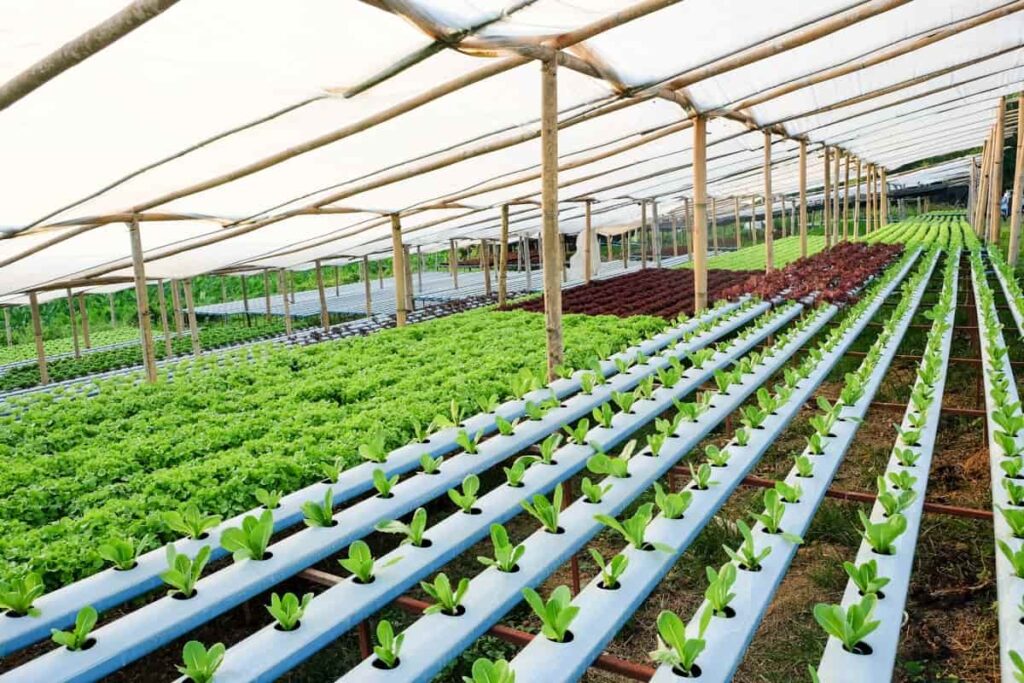
Additionally, the cost of setting up and maintaining a hydroponic system is high, requiring higher expertise and labor than traditional farming methods. This can be challenging for rural farmers who may need more resources. Additionally, hydroponic systems require careful monitoring and maintenance, as incorrect water levels or nutrient solutions can lead to poor crop yields.
Hydroponic Farming Startups in Nigeria
Greenleaf Farms, with an investment of ₦5 million ($12,000), achieves an average revenue of ₦2 million ($4,800) per harvest cycle, resulting in a 40% return on investment. On the other hand, AquaFarm invests around ₦3.5 million ($8,400) and generates an average revenue of ₦1.8 million ($4,300) per harvest cycle, resulting in a 35% return on investment.
These hydroponic farming startups in Nigeria showcase the potential for profitable returns, demonstrating the economic viability of hydroponics in the country’s agricultural landscape. With an average startup cost of around ₦1 million to ₦5 million, hydroponic farming offers an affordable entry point for aspiring entrepreneurs. The controlled environment and efficient resource utilization enable year-round production, leading to higher crop yields.
Startups focusing on high-value crops like tomatoes, lettuce, and herbs have reported profit margins ranging from 40% to 60%. Moreover, the absence of soil significantly reduces the risk of pests and diseases, reducing the need for pesticides and enhancing the overall sustainability of the operation. With the growing demand for locally sourced, fresh produce, hydroponic farming startups in Nigeria have the potential to meet market needs while offering attractive financial prospects for investors and entrepreneurs alike.
Conclusion
Hydroponic farming in Nigeria presents a transformative opportunity for sustainable and efficient agriculture. With its numerous benefits, such as increased yields and resource optimization, hydroponics unlocks the potential for a greener, more prosperous future in Nigerian farming.
- How to Raise Pigs in Your Own Backyard: A Comprehensive Guide
- Budget Friendly Sheep Shed Ideas: Cheap and Low-Cost Tips
- How Much Do Cattle Farmers Make: Revenue Streams in Cattle Farming
- Management Pests and Diseases in Your Cotton Field
- Sheep Farming Business Plan for Beginners
- Aquaponic Farming at Home: A Step-By-Step Guide
- Profitable Village Farming Business Ideas in 2024
- High-Yield Aquaculture: Fast-Growing Fish for Farming
- Effective Fish Pond Construction Techniques for Beginners
- Irrigation and Water Management in Pineapple Farming
- Blossom to Harvest: Mastering Flowering and Pollination in Papaya Farming
- Pig Fattening Essentials: From Selection to Sale for Beginners
- Raising Wagyu Cattle: A Complete Guide for Premium Beef Production
- Soil Types and Their Water Holding Capacity
- Optimizing Irrigation Schedules for Coconut Groves for Enhanced Yield
- Espresso Your Garden: Coffee Grounds for Healthier Acid-Loving Plants
- The Best Soil Mix for Snake Plants: How to Mix Your Own Snake Plant Soil
- Green Thumb Success: Expert Tips for Cultivating Greenhouse Beans All Year Round
- Bloom All Year Round: The Ultimate Guide to Indoor Hyacinth Care
- Eco-Friendly Gardening: How to Make Liquid Fertilizer from Kitchen Waste
- Ultimate Guide to Grow Anise in Pots: Explore Seed Propagation to Harvesting
- Guide to Raising Chester White Pigs: Discover Breed Facts to Growth Management
- Mastering the Elegance: The Ultimate Guide to Weeping Cherry Tree Care, Planting, and Maintenance
- Ultimate Guide to Planting Garlic in Grow Bags: Growing Strategies for Beginners
- How to Fix Spider Plant Leaf-Related Problems: Natural and Organic Remedies
- 10 Reasons Why Your Tulsi Plant is Shedding Leaves: Home Remedies and Solutions
- Optimizing Growth and Yield: The Advantages of Palm Bunch Ash Fertilizer
- Utilizing Neem Oil Extract as a Natural Pesticide for Hydrangea
- From Soil to Harvest: Various Ways in Which Farmers Can Use AI Tools
- Steps to Encourage and Induce Citrus Flowers: A Comprehensive Guide
- How to Fix Snake Plant Leaf-Related Issues: Natural and Organic Remedies
- Transform Your Garden into a Fragrant Oasis with Raat Ki Rani (Night Blooming Jasmine)
- Discover the Ideal Chicken Breeds for Philippine Farms
- How to Create a Poultry Egg Farm Business Plan for Profits
- Grow Lemon Cucumbers Like a Pro: Insider Techniques for Bountiful Yields
- Ultimate Guide to Caring for Your Pink Princess Philodendron: Tips for Thriving Variegation
